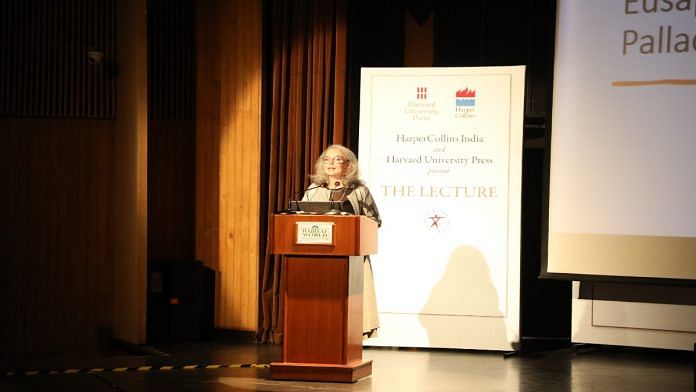New Delhi: Swami Vivekananda’s ideas inspired a global anti-colonial movement and became a touchstone of Hindu nationalist politics a century after his passing away, shows professor-author Ruth Harris’s biography on the guru. Held this Friday, Harris’s talk on her book, Guru to the World: The Life and Legacy of Vivekananda, was the first of a series of talks curated by authors and thinkers from across the globe.
The series, called The Lecture, has been launched by Harper Collins India in collaboration with Harvard University Press. The inaugural lecture was held at the Stein Auditorium of the India Habitat Centre, New Delhi.
The session began with the chief executive of Harper Collins India, Anantha Padmanabhan, addressing the audience about the ‘enduring impact of Vivekananda on the East and the West blending science, religion, politics and fostering a mainstream understanding of Eastern spirituality.’
The guests included Sharmila Sen, the editorial director of Harvard University Press, and senior journalist Supriya Nair who moderated the question-answer session after the lecture. Noted author-historian William Dalrymple was a part of the audience.
The ‘iconic’ monk, often described as ‘Jesuitical’, arises as a counter-argument to Orientalist critiques, which regard East-West exchanges as largely Western appropriation. Harris talked about how she wished to focus more on Vivekananda the human than Vivekananda, the guru, Harris said.
Also read: Return of the Muslim: From Modi ‘sermon’ to Pathaan to Bharat Jodo Yatra
Vivekananda, the philosopher, the monk
The lecture focused on Harris’s definitive biography of Swami Vivekananda, the Indian philosopher and monk who profoundly influenced both eastern and western intellectual and spiritual history. She argued that ‘Vivekananda should be seen as seminal figures of the global 19th century’ at a time when ‘Westerners were reading Max Mueller’s Sacred books of the East and educated Calcuttans read American transcendentalism.’
She spoke on how her aim was ‘not to reinforce the tired narratives of Vivekananda being the first global guru in the materialist West’ but to ‘part from the constraining vision of him as a Hindu revivalist’ and instead combine the global Indian guru who everyone venerated as the symbol of Indian spirituality, tolerance and universalism. Her talk focused on the Orientalist idea of Eastern spirituality where Vivekananda fought against stereotypes and prejudices to insist on India’s global culture, beyond ‘the straitjacket of Orientalism’.
Guru to the World, published by Harvard University Press, describes Vivekananda’s transition from the son of a Calcutta solicitor to a saffron-robed monk. At the 1893 Chicago World’s Parliament of Religions, he captivated audiences with lessons from Hinduism, Western esoteric spirituality, physics, and the mental sciences. Throughout this process, he fought for a more inclusive definition of religion while elaborating on the sins of colonialism. He equated the teachings of modern science as equivalent to teachings of centuries-old Vedantic teachings such as Darwinism and evolution, she said. In rejecting ‘social Darwinism, he rejected the notions of colonialism,’ she added.
Harris went on to present an integrated and interpretive history of Vivekananda’s worldwide endeavour and illuminated his numerous students, most notably the Irish campaigner Margaret Noble – sister Nivedita – who popularised his views despite widespread contempt for the wisdom of a “subject race”.
She discussed his idea of ‘experience’ and ‘perception and superconscious’ and its influence on Western notions of natural sciences. Her lecture focused on his ideas on karma yoga and psychology along with Vivekanda’s idea of Advaita philosophy. She also focused on the ‘feminisation of religion’ in the 19th century in contrast to the ‘muscular idea of religion’ of the West— ‘I am woman among woman’. She also talked about his notions of casteism and communalism and his discourse on tolerance.
The session ended with a discussion of her ideas in relation to the book with the audience and a book-signing.
(Edited by Smriti Sinha)
Also read: Indians’ love of Messi, Maradona & Pele shows Hindutva’s inclusive values, says Hindu Right press



